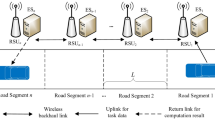Abstract
Vehicle Edge Computing (VEC) is a novel computing paradigm that addresses the computational demands of intelligent vehicles by offloading tasks to edge servers. In a VEC environment, edge servers’ limited storage and processing capacity require a sensible task offloading strategy, where only a part of computing requirement can be offloaded directly to the VEC server and the remaining to the remote cloud. A primary challenge in this context is the creation of an effective and responsive task offloading algorithm that improves the utility. This study proposes an evolutionary game theoretic-based approach, utilizing a Dynamical-Resource Evolutionary Game (DREG) algorithm for decentralized task offloading. DREG leverages the Evolutionary Stable Strategy(ESS) and Adaptive Resource Allocation(ARA) method to optimize response delay and energy cost while increasing success rate. Experimental results indicate that DREG outperforms traditional methods across various performance metrics.
This work was supported in part by the grants from Science and Technology Program of Sichuan Province under Grant No.2024NSFTD0008, and in part by the Young Scientists Fund of the Natural Science Foundation of Henan Province under Grant No.242300421700.
Access this chapter
Tax calculation will be finalised at checkout
Purchases are for personal use only
Similar content being viewed by others
References
Zhang, D., Wang, W., Zhang, J., Zhang, T., Du, J., Yang, C.: Novel edge caching approach based on multi-agent deep reinforcement learning for internet of vehicles. IEEE Trans. Intell. Transp. Syst. (2023)
Truong, T.P., et al.: Partial computation offloading in Noma-assisted mobile-edge computing systems using deep reinforcement learning. IEEE Internet Things J. 8(17), pp. 13196–13208 (2021)
Xu, X., Chen, P., Xia, Y., Long, M., Peng, Q., Long, T.: MRoCO: a novel approach to structured application scheduling with a hybrid vehicular cloud-edge environment. In: 2022 IEEE International Conference on Services Computing (SCC), pp. 84–92. IEEE (2022)
Smith, J.M., Price, G.R.: The logic of animal conflict. Nature 246(5427), 15–18 (1973)
Karimi, E., Chen, Y., Akbari, B.: Task offloading in vehicular edge computing networks via deep reinforcement learning. Comput. Commun. 189, 193–204 (2022)
Gilly, K., Mishev, A., Filiposka, S., Alcaraz, S.: Offloading edge vehicular services in realistic urban environments. IEEE Access 8, 11491–11502 (2020)
Xue, Z., Liu, C., Liao, C., Han, G., Sheng, Z.: Joint service caching and computation offloading scheme based on deep reinforcement learning in vehicular edge computing systems. IEEE Trans. Vehic. Technol. (2023)
Zhou, Z., Feng, J., Chang, Z., Shen, X.: Energy-efficient edge computing service provisioning for vehicular networks: a consensus ADMM approach. IEEE Trans. Veh. Technol. 68(5), 5087–5099 (2019)
Zhu, X., Luo, Y., Liu, A., Bhuiyan, M.Z.A., Zhang, S.: Multiagent deep reinforcement learning for vehicular computation offloading in IoT. IEEE Internet Things J. 8(12), 9763–9773 (2020)
Du, J., Yu, F.R., Chu, X., Feng, J., Lu, G.: Computation offloading and resource allocation in vehicular networks based on dual-side cost minimization. IEEE Trans. Veh. Technol. 68(2), 1079–1092 (2018)
Liu, Y., Wang, S., Huang, J., Yang, F.: A computation offloading algorithm based on game theory for vehicular edge networks. In: 2018 IEEE International Conference on Communications (ICC), pp. 1–6. IEEE (2018)
Tang, C., Wu, H.: Joint optimization of task caching and computation offloading in vehicular edge computing. Peer-to-Peer Netw. Appl. 15(2), 854–869 (2021). https://doi.org/10.1007/s12083-021-01252-w
Dai, P., Hu, K., Wu, X., Xing, H., Yu, Z.: Asynchronous deep reinforcement learning for data-driven task offloading in MEC-empowered vehicular networks. In: IEEE INFOCOM 2021-IEEE Conference on Computer Communications, pp. 1–10. IEEE (2021)
Huang, X., He, L., Chen, X., Wang, L., Li, F.: Revenue and energy efficiency-driven delay-constrained computing task offloading and resource allocation in a vehicular edge computing network: a deep reinforcement learning approach. IEEE Internet Things J. 9(11), 8852–8868 (2021)
Liu, S., Yang, Q., Zhang, S., Wang, T., Xiong, N.N.: MIDP: an MDP-based intelligent big data processing scheme for vehicular edge computing. J. Parallel Distrib. Comput. 167, 1–17 (2022)
Xu, X., Xia, Y., Zeng, F., Li, F., Xie, H., Fu, X., Wang, M.: A novel vehicular task deployment method in hybrid MEC. J. Cloud Comput. 11(1), 88 (2022)
Li, J., et al.: A multi-armed bandits learning-based approach to service caching in edge computing environment. In: Zhang, Y., Zhang, L.J. (eds.) ICWS 2023. LNCS, vol. 14209, pp. 3–17. Springer, Cham (2023). https://doi.org/10.1007/978-3-031-44836-2_1
Lakhan, A., Li, X.: Mobility and fault aware adaptive task offloading in heterogeneous mobile cloud environments. In: EAI Endorsed Transactions on Mobile Communications and Applications, vol. 5, no. 16 (2019)
Abd, S.K., Al-Haddad, S.A.R., Hashim, F., Abdullah, A.B., Yussof, S.: Energy-aware fault tolerant task offloading of mobile cloud computing. In: 2017 5th IEEE International Conference on Mobile Cloud Computing, Services, and Engineering (MobileCloud), pp. 161–164. IEEE (2017)
Droob, A.: Fault tolerant horizontal computation offloading. In: 2023 IEEE International Conference on Edge Computing and Communications (EDGE), pp. 177–182. IEEE (2023)
Chowdhury, C., Roy, S., Ray, A., Deb, S.K.: A fault-tolerant approach to alleviate failures in offloading systems. Wirel. Pers. Commun. 110(2), 1033–1055 (2020)
Author information
Authors and Affiliations
Corresponding author
Editor information
Editors and Affiliations
Rights and permissions
Copyright information
© 2025 The Author(s), under exclusive license to Springer Nature Switzerland AG
About this paper
Cite this paper
Li, J. et al. (2025). An Evolutionary Game Theoretic-Based Approach to Task Offloading in Hybrid Vehicular Cloud-Edge Environment. In: Zhang, Y., Zhang, LJ. (eds) Web Services – ICWS 2024. ICWS 2024. Lecture Notes in Computer Science, vol 15428. Springer, Cham. https://doi.org/10.1007/978-3-031-77072-2_1
Download citation
DOI: https://doi.org/10.1007/978-3-031-77072-2_1
Published:
Publisher Name: Springer, Cham
Print ISBN: 978-3-031-77071-5
Online ISBN: 978-3-031-77072-2
eBook Packages: Computer ScienceComputer Science (R0)




